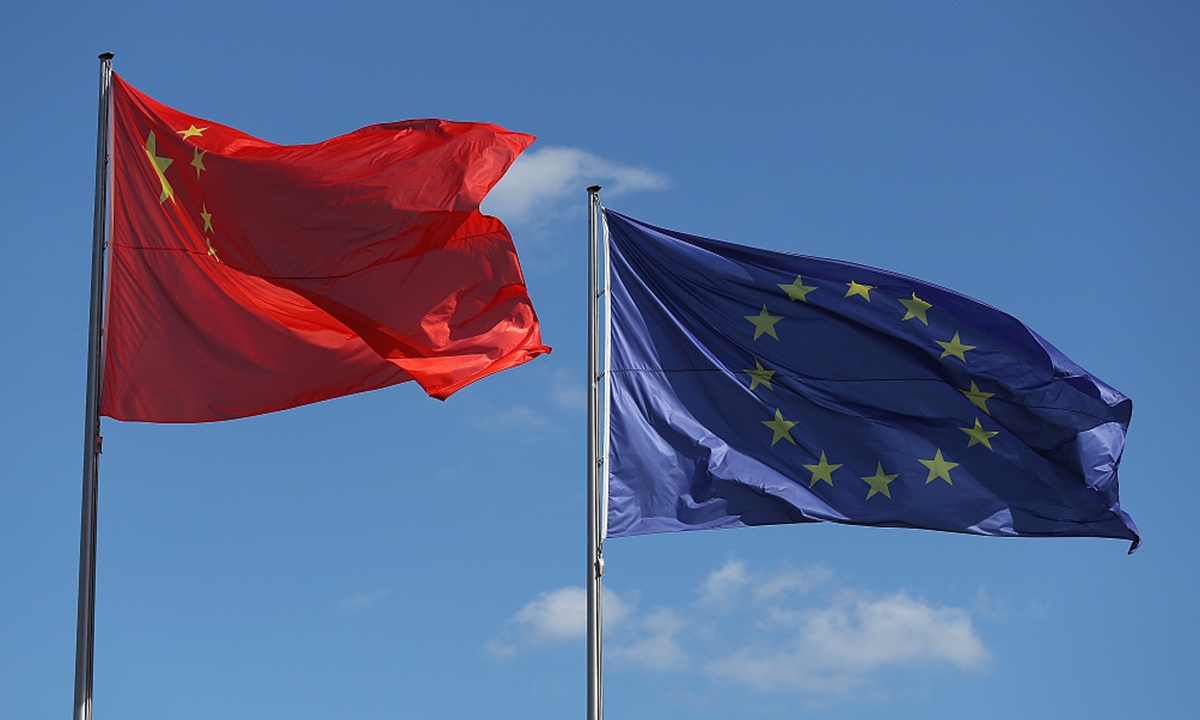
China EU Photo:VCG
The EU has stepped up protectionism and its business environment has worsened in recent years, creating certain difficulties for many Chinese companies investing and operating in the EU, read a report by the academy of China's trade promotion agency.
A sound business environment in the EU is the common aspiration of foreign companies and will also be more attractive to Chinese companies, said the report, titled "Business Environment of the European Union 2022/2023."
The report was released on Wednesday during a press conference by the Academy of China Council for the Promotion of International Trade (CCPIT), which has published an annual report on EU's business environment since 2019.
Since 2022, the EU has developed a protectionist policy toolbox, making it more difficult for foreign enterprises to invest, merge and acquire and participate in public procurement in the EU, the report showed.
The EU has even interfered with their supply chain cooperation inside and outside the EU, leading to restrictions on their normal production and operation activities and a significant deterioration of EU's business environment.
According to the survey, some 33 percent of the respondents believe that the business environment in the EU has deteriorated, an increase of 5.86 percentage points from in 2021.
The report noted four major challenges posed by the EU to foreign companies: increased market access barriers, tendency to politicize economic issues, increased excessive regulations and unfair treatment against Chinese companies.
According to the report, 45.6 percent of the surveyed Chinese enterprises believe that the EU has raised its market access barriers, and 40 percent of the surveyed enterprises changed their investment plans because of the EU foreign investment review.
Meanwhile, 61.4 percent of companies surveyed believe the EU and its member states have a tendency to politicize economic issues.
Chinese enterprises also said that EU's compliance requirements based on supply chains go far beyond the scope of enterprises' control and the social responsibilities they should undertake, which made their costs of compliance much higher. Meanwhile, EU enterprises may abandon their partners in the international market for the sake of reducing compliance risks, and result in a broken supply chain and decoupling between EU enterprises and their foreign counterparts.
Cui Hongjian, director of the Department of European Studies at the China Institute of International Studies, told the Global Times on Wednesday that as the report took an objective point of view, the EU has been tightening its scrutiny of Chinese investment and adding political factors to bilateral normal economic cooperation over recentyears, posing some challenges.
Political principles, instead of practical interests, have overwhelmed economic rules. As a result, the previous win-win China-EU ties based on mutual benefit were dragged into a zero-sum mentality, Cui noted.
While calling for the cancelation of restrictions on Chinese firms, experts said the two sides should find more common ground and overlapping fields where both sides want to promote cooperation.
There is huge room for cooperation in sustainable development, green finance, digital economy, multilateral cooperation and global governance, Zhao Ping, vice president of the CCPIT Academy, said at the press conference.
"We hope that the EU will continue to improve its business environment and that foreign-invested enterprises will play a bigger role in boosting economic growth and job creation in the EU, thus creating broader space for China-EU cooperation. There is no geopolitical conflict or fundamental conflict of interests between China and the EU," Zhao noted.
The survey indicates that if the review is relaxed, 28.7 percent of the respondents will expand investment in the EU. If the China-EU Comprehensive Agreement on Investment is ratified and implemented, 40.87 percent of Chinese companies would increase their investment in EU market.
Analysts stressed the importance of healthy China-EU relations, which go beyond the bilateral scope and have global significance.
"Despite current challenges and uncertainties, China and the EU should hold hands firmly in the traditional trade area, which is also an essential issue for the bloc," Cui said, noting that with the Chinese economy back on the recovery track in the post-COVID era, the huge market is becoming more appealing for European firms.
In 2022, China-EU trade in goods totaled $847.3 billion, up 2.4 percent year-on-year. A total of $7 billion in Chinese investment flowed into the EU in 2022, making the cumulated investment exceed $102.9 billion, official data showed.




